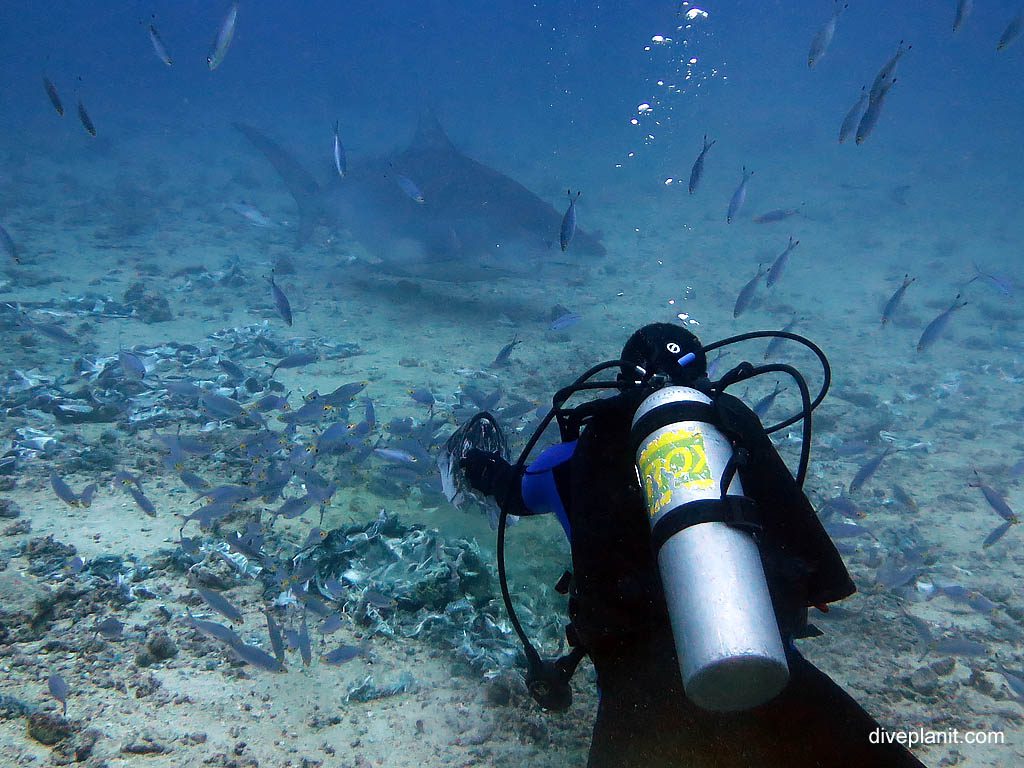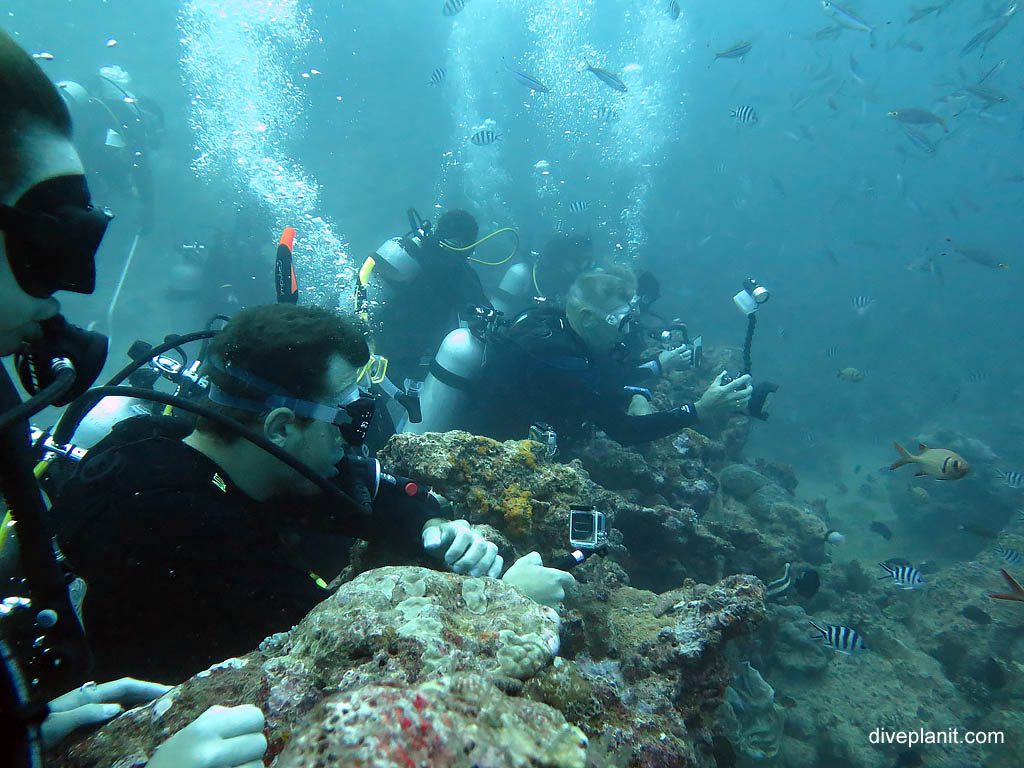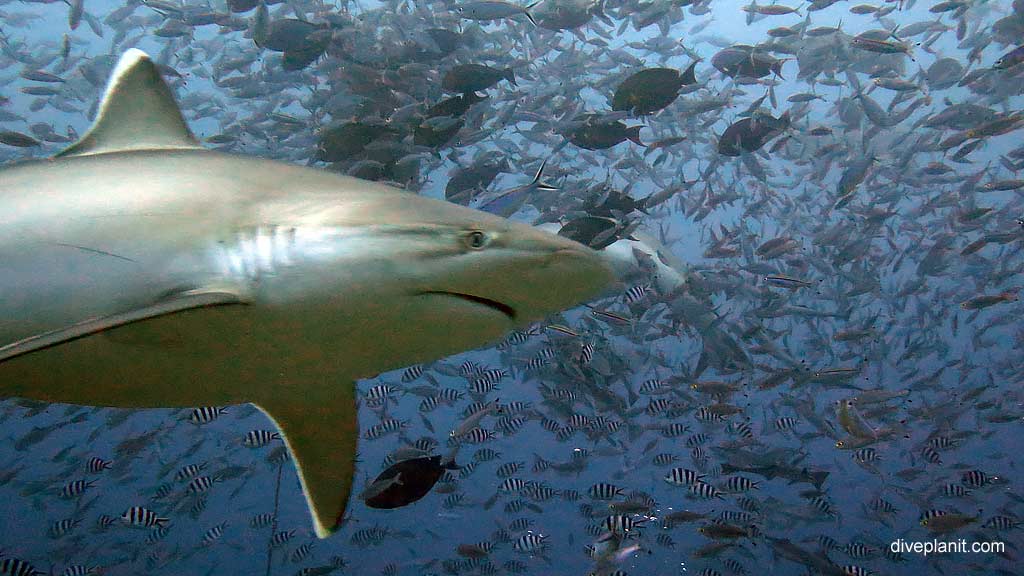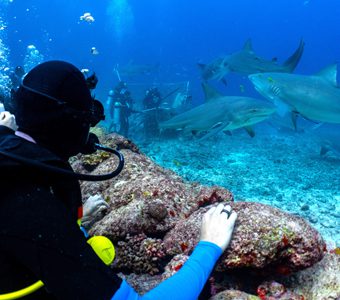With a recent proposal to bring ‘shark tourism’ to the Gold Coast, we thought we’d take a look at the pros and cons of ‘shark dives’. So what are the arguments for and against?
Some would argue that experiences like this bring people closer to sharks and therefore increase awareness, understanding and appreciation for these widely feared apex creatures, therefore contributing to their conservation.
Indeed Sea Shepard’s Nicole McLachlan positively endorsed the proposal in the Gold Coast Bulletin:
“This is a fantastic alternative to killing sharks and the projection of an irrational fear of these highly important, yet misunderstood, creatures.”
Others argue that we shouldn’t alter the behaviour of sharks to bring them close to humans.

It’s a tricky one.
Fiji Islands, our neighbours in the Pacific, have successfully run a number of shark (feeding) dives for over 20 years without a single fatality. These include AquaTrek, Beqa Lagoon Resort, and Barefoot Kuata. The guests go to see the sharks, rather than specifically to see them being fed, but of course, the sharks wouldn’t be there otherwise.
Many would argue that it’s great to see apex predators in their own environment, and this promotes awareness, respect and supports shark conservation efforts. After all, the sharks are not in captivity nor are they harmed in any way – quite the contrary. Does this differ much from the land based equivalent of an African safari, where man invites himself into close proximity with wild animals with potentially lethal consequences?
In Fiji, the zones selected for shark feeding are considered carefully before any site is established, taking into account existing local fishing and diving sites. Local village chiefs need to be consulted to negotiate a territory that becomes ‘tabu’, i.e., protected from fishing – effectively creating a marine sanctuary. There is often a ‘reef levy’ included in the guest dive charge which is donated directly to the local community, usually focussed on improving education for locals.
Having witnessed shark feeding first hand, I don’t consider it in any way sensationalist. It is more like a ritual – the sharks are treated reverently. The Fijian guides clearly have profound respect and admiration for these creatures.
Does this differ from places such as Kanchanaburi where you can (safely?) sit around with seemingly tolerant tigers? Are those tigers behaving differently to ‘normal’? Has their instinctive behaviour been changed? (There are arguments about the tigers too of course, with some people claiming the animals are drugged, but I’ve seen strong arguments for – from people who have experienced it for themselves.)

Perhaps the world’s most famous shark dive experience is the one established by Rodney Fox in South Australia. In 1963 Fox was almost killed by a shark but (despite his injuries) he was fascinated by these creatures and believed they were being portrayed more fearsomely than they actually were.
Ironically, his cage diving experience became famous after the success of the movie Jaws, when an American dive travel company first approached him to take clients on a Great White Shark expedition.
“Every tour adds to our research. Every guest contributes to us learning more about Great White Sharks.”
Normally sharks avoid the presence of divers and swim away if we get too close, unlike a dolphins or seals, which often swim up inquisitively to see if we want to play. But dolphins and seals, like us, are mammals and fairly intelligent. Though sharks have been around a long time, (about 420,000,000 years actually) and are highly effective at what they do, they have had no requirement to develop much of a sense of curiosity or humour.
So why would you deliberately feed sharks and bring them closer in-shore? Truth be told, we actually do this already along the Queensland coast with baited lines – supposedly for the protection of humans.
Still, the question remains: to what extent does hand-feeding sharks, particularly bulls and tigers, affect their behaviour, and most importantly, their behaviour towards man?

Does it take us along an evolutionary journey where sharks are very happy to see us in their ocean, as long as we bring an offering (otherwise we become the offering)?
Personally, I don’t think it’s that complicated: they just know that on Saturdays and Wednesdays there’s free grub at a certain place in the ocean, and like Yorkshiremen, they tuck in, and depart without so much as a wink of thanks. But how do they know when it’s Wednesday?
We’d be interested in your thoughts…








